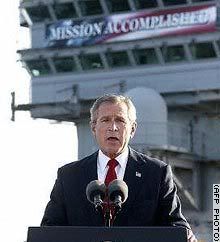THINK BIG: Forever Changed
 Celebrity Hijinx's not-so-fun fact of the day reminds that today is the 4th anniversary of the war in Iraq. Dino and Sara are probably going to take away my computer because I spent a whole day talking about big airplanes in the sky and now I'm flying directly over celebrity gossip/pop culture to visit the serious world:
Celebrity Hijinx's not-so-fun fact of the day reminds that today is the 4th anniversary of the war in Iraq. Dino and Sara are probably going to take away my computer because I spent a whole day talking about big airplanes in the sky and now I'm flying directly over celebrity gossip/pop culture to visit the serious world:
President Bush declared the an end to major combat in Iraq under a "Mission Accomplished" banner on May 1, 2003. Here is a story about the human side of war -
Jared doesn't remember the two weeks after the rocket attack that downed the helicopter he was in, killing 16 on board. But he still struggles to recover from the crash that left him with a brain injury and stitches from one ear to the other. He is among more than a dozen local servicemen who were roaming the halls in high school one year, then scattered on the frontlines of a war in
It was the deadliest strike against
Jared said he doesn't remember the accident or the two weeks after the crash. Most of his memories of
Jared, now living and working in construction on the west coast, was medically discharged from the Army, but not before he was nearly sent back to
“A part of me wishes I was still there. I miss the camaraderie. Plus, watching the news every day, seeing people getting injured and killed in a place where you were — it's frustrating. You think if you were there, you could be making a difference,” he said. “It was close for me, and it could have ended a whole lot differently. You appreciate life a lot more. There are a lot of people who didn't come back, and their families and everyone they knew are forever changed, too.”
I've been saving this personal story for a day like today. Unfortunately, so many soldiers and their families have these stories. Recently, Anderson Cooper brought media attention to a story about 25 year-old Marine Jonathan Schulze who earned two purple hearts for fighting in Iraq but was rejected by a Minnesota VA hospital even after he told them he was "suicidal." Four days after his visit to the VA hospital, Jonathan Schulze put a household electric cord around his neck and hanged himself in the basement of a friend's home. A picture of his one-year-old daughter was at his side. It's so easy to focus so much on the politics of the situation that we lose focus on the human aspect of these occurrences. So today, take a moment think about people like Jared, Jonathan and also the innocent civilians in Iraq whose names and stories we don't even know) and trust that this can come to a civilized end in the near future. In the meantime, continue to spread compassion on a daily basis and hope that someday experiences like these can be eradicated and society would be “forever changed.”

1 comment:
an athletic medical device, that the military has recognized as a possible solution to MTBI. It has been a subject of controversy in the NFL, for liability reasons it has been concealed. In fact a story about it in ESPN the magazine set of a chain of events which has led to the resignation of the medical advisor to the NFL.
The retainer like mouth guard used by the N.E. England Patriots has been proven to aide in the prevention of concussion in an AAOP peer study.It is based on a procedure which corrects and balances dislodged cartilage in the TMJ. Doctors at Tufts, a Harvard researcher and many others feel this would greatly benefit the troops. Many studies have also shown an improvement in isometric strength, reducing stress and fatigue, a major problem.
The Patriots consistently have the lowest concussion rate in the NFL, because 70% of their players are fitted with this orthodic corrective device
Post a Comment